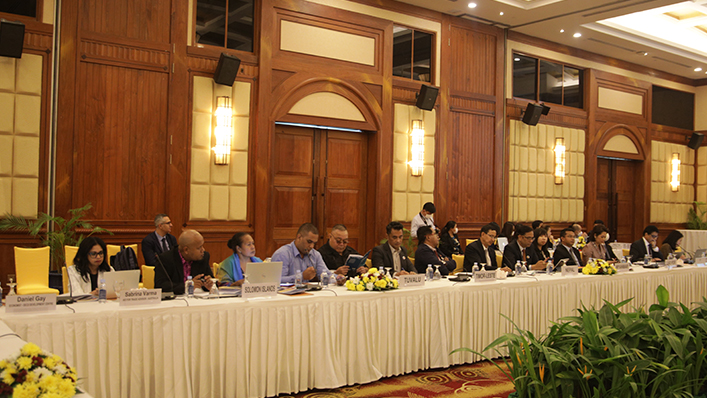
The consultations were held ahead of the Fifth United Nations Conference on the Least-Developed Countries (LDC5), to take place from 5 to 9 March in Doha, Qatar. Hosted by the United Nations Economic Commission for Africa (UNECA), the first meeting was held in Addis Ababa on 17 and 18 January for Haiti and African LDCs. The second meeting was organized for LDCs of Asia-Pacific on 30 and 31 January and hosted by Cambodia in Siem Reap.
Under discussion were trade impacts for countries graduating from LDC status, LDCs’ regional integration and evolving trading trends in LDCs. Participants also discussed ways of strengthening LDCs’ capacity to trade, including opportunities provided by digital trade. DDG Zhang encouraged the participants to keep reviewing their evolving trade interests and called for strengthening dialogue between government officials based in capitals and officials based in Geneva.
“Coordinated and concerted measures are needed to enable LDCs to better access international trade and global value chains. LDCs can derive significant benefit from a multilateral trading system under the WTO,” said Rabab Fatima, UN Under-Secretary General and High Representative of the United Nations Office of the High Representative for the Least- Developed Countries, Landlocked Developing Countries and Small Island Developing States (UN-OHRLLS).
“As we are approaching the Fifth UN Conference on LDCs, it is very important for LDCs to strategize on our shared vision for trade and development for the next decade,” said Ambassador Kadra Ahmed Hassan of Djibouti, who coordinates the LDC Group in the WTO. “This would allow us to pave a clear road ahead on where we would like to be with our trade and development efforts in 2031.”
Samheng Bora, Cambodia’s Secretary of State at the Ministry of Commerce, said: “We strongly believe that the multilateral trading system can bring economic benefits to our country and that trade preferences and capacity building can make trade work for all. Aid for Trade initiatives like the Enhanced Integrated Framework are important for bringing together development partners, agencies and national stakeholders to build trade capacity, to support economic diversification in LDCs and to enable inclusive and sustainable trade development.”
The consultations were organized jointly by UN-OHRLLS, the Enhanced Integrated Framework, the WTO and UN regional economic commissions. The outcomes of the consultations will be presented at the LDC5 Conference. There are currently 46 LDCs, of which 35 are WTO members and eight are in the process of accession.
Share
Reach us to explore global export and import deals